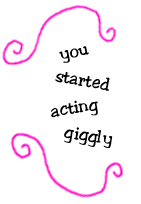 Q Dear Miss Abigail:
Q Dear Miss Abigail:
Could “I hate you” mean “I like you”? I ask this because there’s this guy and when we we’re playing and joking around he said “I hate you” and I said “I hate you” back. But when I said “I hate you,” I really wanted to say “I like you.” So like instead of him saying “I like you” he says “I hate you.” Is it like him saying “I like”? Is he just too shy to say “I like you”?
Signed,
Alex
A Dear Alex:
Lucky for you, I have an amazing talent for interpreting just such a conversation. Closing my eyes, thinking, thinking ~ hey, I think he likes you!
Here’s some advice that might help explain why communicating with boys can be so difficult. It’s from Ellen Peck’s informative book titled How to Get a Teen-Age Boy and What to Do with Him When You Get Him, written in 1969. And before I go, please remember, Alex, that like is such a strong word. Please use it very carefully.
1969: What A Teen-Age Boy is Like
![]() A teen-age boy is basically insecure.
A teen-age boy is basically insecure.
It all started when you were twelve and he suddenly noticed that you were wearing a bra. That’s all the evidence he needed that you were definitely and completely female. But you left him feeling very unsure of himself as a male. Especially when you started acting giggly and embarrassed whenever he came around. (Yes, you did too.) And that nice, comfortable feeling he had with you ~ and with all girls when they looked pretty much like he did ~ changed. You became different then. Because of that bra, and the giggly behavior, he began to feel uncomfortable and tongue-tied around you. And maybe he isn’t quite over that feeling yet. Even though you’ve stopped the giggling. (Or, if you haven’t, do.)![]()
Source: Peck, Ellen. How to Get a Teen-Age Boy and What To Do With Him When You Get Him. New York: Bernard Geis Associates, 1969.
~ pp. 54-55 ~